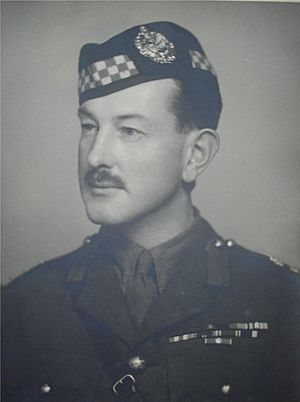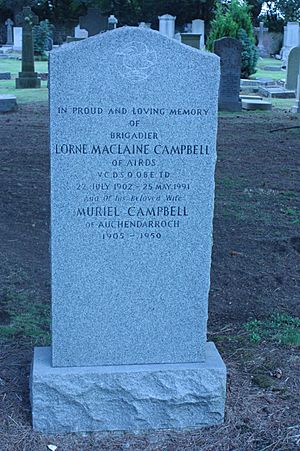Lorne MacLaine Campbell facts for kids
Quick facts for kids
Lorne MacLaine Campbell
|
|
|---|---|
 |
|
| Born | 22 July 1902 Airds, Argyll, Scotland |
| Died | 25 May 1991 (aged 88) Edinburgh, Scotland |
| Buried |
Warriston Cemetery, Edinburgh, Scotland
|
| Allegiance | United Kingdom |
| Service/ |
British Army |
| Years of service | 1921–1945 |
| Rank | Brigadier |
| Service number | 16220 |
| Unit | Argyll and Sutherland Highlanders |
| Commands held | 13th Infantry Brigade 7th Battalion, Argyll and Sutherland Highlanders |
| Battles/wars | Second World War |
| Awards | Victoria Cross Distinguished Service Order & Bar Officer of the Order of the British Empire Mentioned in Despatches (4) Territorial Decoration Legion of Merit (United States) |
| Relations | Gordon Campbell (uncle) |
Lorne MacLaine Campbell (born July 22, 1902 – died May 25, 1991) was a brave officer in the British Army. He was from Scotland and received the Victoria Cross, which is the highest award for courage given to soldiers in Britain and the Commonwealth. This award is given for showing extreme bravery when facing the enemy. He also received other important awards for his leadership and courage during the Second World War.
Contents
Growing Up and School
Lorne MacLaine Campbell was born on July 22, 1902, in a place called Airds in Argyll, Scotland. He was the oldest of three sons. He went to school at Dulwich College Preparatory School and then Dulwich College in South London. His uncle, Gordon Campbell, who also won the Victoria Cross, went to the same school.
After school, from 1921 to 1925, Lorne studied at Merton College, Oxford University. He was very involved in student life there. After finishing university, he joined his family's business, which sold wine.
Military Career
Lorne Campbell officially joined the army as a second lieutenant in the 8th battalion of the Argyll and Sutherland Highlanders on September 23, 1921. This was a part of the Territorial Army. His own father was in charge of this battalion at the time. By 1939, Campbell had become a major and was second-in-command of the battalion.
Serving in World War II
In August 1939, just before the Second World War began, Campbell's unit was called up for war. His battalion was part of the 51st (Highland) Infantry Division. They trained for many months before going to France in January 1940 as part of the British Expeditionary Force (BEF).
Bravery in France
During the Battle of France in May–June 1940, Campbell showed great leadership. His division was trying to retreat to the coast. Even though many soldiers were captured, Campbell and his brigade managed to reach Le Havre and were safely evacuated. For his brave leadership during this difficult time, he received the Distinguished Service Order (DSO).
After returning home, his battalion had lost many soldiers. It was rebuilt with new members. In 1942, Campbell became the leader of the 7th Battalion, Argylls. He led them to North Africa in August 1942.
Fighting in North Africa
At the Second Battle of El Alamein in late 1942, Campbell again showed amazing courage. He helped capture important areas. For this, he received a Bar to his DSO, which means he got the award a second time.
He then led his battalion through the rest of the Tunisian campaign. They fought in places like El Agheila, helped capture the city of Tripoli, and fought in the Medenine and Wadi Akarit. It was at Wadi Akarit that he earned his Victoria Cross.
Leading in Italy
In May 1943, Campbell was promoted to the rank of brigadier. He took command of the 13th Infantry Brigade. This brigade was part of the 5th Infantry Division. They fought in the Allied invasion of Sicily and then the Allied invasion of Italy. Campbell led his brigade through tough battles in Italy, including the Moro River Campaign, the Battle of Monte Cassino, and the Battle of Anzio. He left Italy in July 1944 to rest and prepare for more fighting.
The Victoria Cross Story
Lorne Campbell was 40 years old and a temporary lieutenant colonel when he earned his Victoria Cross. This happened on April 6, 1943, during an attack on the Wadi Akarit position in Tunisia.
His battalion had a very difficult job. They had to break through enemy minefields and an anti-tank ditch in the dark. Even with heavy machine gun and shell fire, Lieutenant-Colonel Campbell successfully led his soldiers. They captured at least 600 enemy soldiers and reached their goal. They even had to cross a dangerous part of the minefield that had not been cleared.
When they reached their objective, they found that a gap made for vehicles did not line up with the cleared path in the minefield. Campbell knew it was vital to quickly make a new path for anti-tank guns. It was now daylight, and under very heavy enemy fire, he personally went forward to check the area. He then directed the operations to create a new vehicle path.
Throughout the day, Campbell and his battalion held their position. They faced constant, heavy shell fire from the enemy. Around 4:30 PM, the enemy launched strong counter-attacks, even with tanks. During this intense fighting, Lieutenant-Colonel Campbell showed incredible bravery and did not care about his own safety. He knew it was extremely important to hold the area his battalion had captured.
He inspired his men by being right at the front of the battle. He cheered them on and gathered them where the fighting was toughest. When one of his companies was forced to move back, he went forward alone into a hail of bullets and shells. He personally helped them get back into position and stayed with them until the attack was stopped.
As more soldiers arrived, he was seen standing in the open, directing the fight, even though enemy infantry were firing at close range. He continued to lead even after being wounded in the neck by shell fire. He only allowed his wound to be treated when the fighting calmed down. Even then, though in great pain, he refused to leave. He stayed with his battalion, continuing to inspire them just by being there.
When darkness fell, the Argylls still held their positions, even though many of their officers and men were hurt. There is no doubt that without Lieutenant-Colonel Campbell's strong will, amazing courage, and disregard for pain, the important area they had captured would have been lost. His bravery and outstanding leadership, especially when his tired men were fighting the enemy with bayonets and hand grenades, were truly remarkable.
Life After the War
In December 1935, Campbell married Amy Muriel Jordan. They had two sons, Alastair Lorne Campbell of Airds (born 1937) and Patrick Gordon Campbell (born 1939).
After the war, Campbell went back to working in the wine business. He was honored again in 1968 when he was made an Officer of the Order of the British Empire (OBE).
Lorne Campbell passed away on May 25, 1991, at the age of 88, in Edinburgh, Scotland. He is buried in Warriston Cemetery in Edinburgh. His medals, including the Victoria Cross, are on display at the Argyll and Sutherland Highlanders Museum in Stirling Castle.


